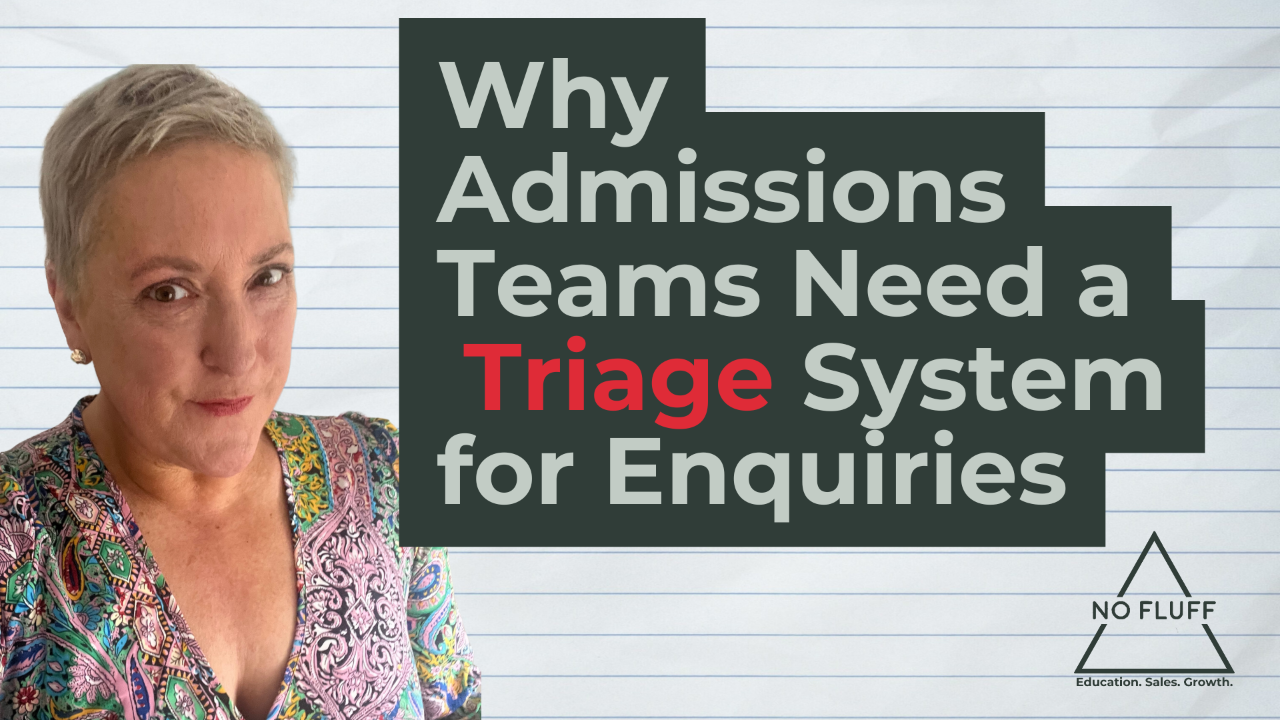Why Admissions Teams Need a Triage System For Enquiries
Mar 10, 2025
Triage for Student Recruitment: Qualifying Enquiries to Save Time and Boost Enrolments
In student recruitment, time is precious, and enquiries can be overwhelming. Some students are ready to proceed, some need nurturing, and some… well, they were just curious. How do you handle this influx without sacrificing your sanity (or your team’s)? The answer lies in a little triage. Yes, just like in a busy hospital, we need to sort through the enquiries to decide who needs our attention most—and fast.
Here’s how you can approach enquiry triage in a way that saves time and keeps your team focused on the right prospective students.
The Triage Mentality: Why Sorting Matters
Admissions teams often feel stretched thin, with too many tasks and not enough hours in the day. Triage isn’t about dismissing people; it’s about working smarter, not harder (even though I hate that phrase!). By sorting enquiries upfront, you can:
- Save Time: Spend less effort chasing enquiries that aren’t a fit.
- Improve Conversion Rates: Focus energy on those more likely to enrol.
- Streamline Workflows: Create clear processes for different types of enquiries.
Think of it like this: you wouldn’t schedule surgery for someone with a paper cut, but you also wouldn’t ignore someone with chest pain. Triage helps you identify what’s urgent, what can wait, and what isn’t worth pursuing. Ok, so this is a bit dramatic, but you know what I mean.
Four Key Questions to Ask When Qualifying Enquiries
To get started, you need to ask the right questions. These questions will help you assess whether an enquiry is worth pursuing actively or if it belongs in a more passive or automated flow. Here are four essential questions to guide your triage:
- Can we help them?
Do their needs align with what we offer? If you’re a day school and they’re looking for boarding options, it’s probably not a match. - Are they willing to pay for that help?
Let’s not be shy here. If they’re not in a position to pay your fees, it’s unlikely to work out. There may be bursaries, but we also need fee-payers. - Do we want to help them?
Are they the kind of student or family who fits with your institution’s ethos? If not, it might be better to politely decline rather than invest time. If you can afford to. - Does everyone involved in the decision want help too?
Are the parents or decision-makers on board? If not, this could delay or derail the process.
Devise Your Own Triage Questions
Every institution and agency is different, so your triage process should reflect your unique priorities. Here are a few additional questions to consider:
- How soon are they looking to start?
If their timeline doesn’t match your availability, you might not want to dedicate resources to their enquiry. - Have they enquired before?
Repeat enquirers might need different handling—are they just gathering information, or are they finally ready to commit? It might be nervousness on their part. - What’s their level of engagement?
Are they responding promptly and engaging with your team, or are they ghosting after every email? - Are they open to guidance?
If they’re resistant to advice or unwilling to provide key details, they might not be the right fit.
Two Workflows: Active and Passive
Once you’ve triaged your enquiries, it’s time to decide on workflows. Not every lead requires the same level of attention, and dividing them into two categories can save your team precious hours.
Active Workflow
Hot leads—those who tick all the boxes above—go into your active workflow. These enquiries get:
- Personalised follow-ups.
- Regular check-ins.
- Priority scheduling for tours, calls, or next steps.
Passive Workflow
Cooler leads can move into a more passive or even automated workflow, such as:
- Email nurture sequences with fewer calls
- Information packs sent automatically.
- Periodic check-ins to gauge interest.
This way, your team can focus their energy where it matters most, without completely dropping less promising leads. Note, none of them are entirely ditched!
Why Speed Matters in Triage
The faster you triage, the more efficient your admissions process will be. Spending weeks on an enquiry only to realise they’re not a good fit is a frustrating waste of time. By implementing a triage system, you’ll:
- Avoid wasting energy on dead-end leads.
- Provide a better experience for those who are ready to enrol.
- Free up time to handle other pressing tasks.
If you don’t have many enquiries, you can afford to take your time. But if your inbox is flooded, a triage system isn’t just helpful—it’s essential.
Final Thoughts
Qualifying enquiries is about making the best use of your team’s time and energy. By adopting a triage approach, you can focus on the right people at the right time, improving both your workflow and your enrolment numbers. Start by asking the key questions, build workflows for active and passive leads, and watch your efficiency soar.
Need help mapping your enquiry process? Let’s chat—you’ll be amazed how much time you can save with the right systems in place. You can book a quick call with our team here
If you're interested in having a chat to find out how I can help you increase sales or to just get to know each other, then please book in a call!
Stay connected with tips, news and updates that will give you solid sales support, and a bit of a smile along the way.
Don't worry, your information will not be shared, and you can unsubscribe at any point.
We hate SPAM. We will never sell your information, for any reason.

